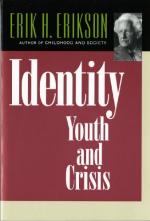
|
| Name: _________________________ | Period: ___________________ |
This quiz consists of 5 multiple choice and 5 short answer questions through Chapter 3, The Life Cycle, Epigenesis of Identity.
Multiple Choice Questions
1. What does it mean when the author states, "to review the concept of identity"?
(a) Sketch its history.
(b) Disprove identity.
(c) Give a lecture.
(d) Write an outline.
2. As discussed in Chapter 2, who is able to trigger transference of models of identity formation within younger members of society?
(a) Self.
(b) Peers.
(c) Church leaders.
(d) Parents.
3. In Chapter 2, what does Erikson feel about how psychologists treat social dynamics and external social elements?
(a) As keys to social competence.
(b) The coexist.
(c) As surface events.
(d) As deep rooted elements of social identity.
4. As noted in Chapter 2, how can false or inaccurate ego identity formations be corrected after being developed by parents in terms of group identity development?
(a) They cannot be corrected.
(b) By immersion.
(c) Through psychotherapy.
(d) By reworking associations.
5. At what stage in Erikson's theory of development may an individual begin to lose confidence or identity and enter period of listlessness?
(a) Generativity vs. stagnation.
(b) Autonomy vs. shame.
(c) Industry vs. inferiority.
(d) Intimacy vs. isolation.
Short Answer Questions
1. According to Freud, what is the first stage of identity development called?
2. During the third stage of Erikson's theory of development, what may occur if an individual's initiatives or attempts at something continually fail?
3. Why does Erikson warn the reader not to expect any solid development of mythology in terms of integrating the work on identity over the past two decades?
4. According to Erikson, in his review and observations of changes in culture, what does he suggest will become common values among today's youth?
5. According to Erikson in Chapter 2, what does personal identity focus on?
|
This section contains 304 words (approx. 2 pages at 300 words per page) |

|




